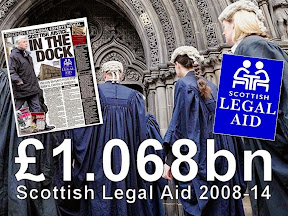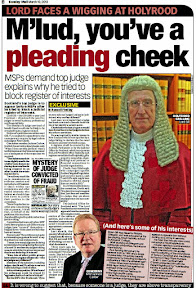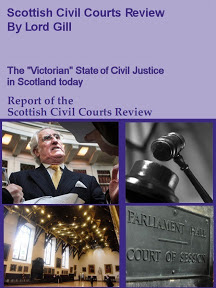 Scottish Parliament debate on register of judicial interests. ON Thursday 09 October 2014, the Scottish Parliament’s main chamber held a detailed ninety minute debate on calls to require judges to declare their significant financial and other interests, as called for in Petition PE1458: Register of Interests for members of Scotland’s judiciary. On conclusion of the debate, MSPs overwhelmingly supported motion S4M-11078 – in the name of Public Petitions Convener David Stewart MSP on petition PE1458 and urged the Scottish Government to give further consideration to a register of interests for judges..
Scottish Parliament debate on register of judicial interests. ON Thursday 09 October 2014, the Scottish Parliament’s main chamber held a detailed ninety minute debate on calls to require judges to declare their significant financial and other interests, as called for in Petition PE1458: Register of Interests for members of Scotland’s judiciary. On conclusion of the debate, MSPs overwhelmingly supported motion S4M-11078 – in the name of Public Petitions Convener David Stewart MSP on petition PE1458 and urged the Scottish Government to give further consideration to a register of interests for judges..
The public petition, submitted to the Scottish Parliament’s Public Petitions Committee in late 2012 envisages the creation of a single independently regulated register of interests containing information on judges backgrounds, their personal wealth, undeclared earnings, business & family connections inside & outside of the legal profession, offshore investments, hospitality, details on recusals and other information routinely lodged in registers of interest across all walks of public life in the UK and around the world.
In a move aimed at widening public awareness of the undisclosed interests of Scotland’s judiciary and details contained in the recent debate by MSPs at Holyrood, each day this week, Diary of Injustice is publishing the official record of the speeches given by individual MSPs who participated in the debate along with video footage.
This article focuses on the speech given by David Torrance MSP (Kirkcaldy) (SNP). David Torrance is also a member of the Public Petitions Committee.
David Torrance (Kirkcaldy) (SNP): Like others, I would like to take this opportunity to thank Peter Cherbi for submitting the petition in question and the committee clerks for all their work.
The debate over whether to introduce a register of interests for the judiciary in Scotland is an intriguing one. It is true that there is currently no such register and that alternative arrangements are in place that arguably compensate for that. However, it is also true that registering one’s interests is now commonplace among all high-office public service personnel and that doing so increases transparency and accountability to the people we represent and serve. That is the point on which I would like to focus and is the main reason why I support the petitioner’s call for a register of interests to be introduced.
In Scotland, we take great pride in our legal system, and the integrity of our judges and sheriffs is paramount. We place a great deal of trust in our judiciary and things such as the judicial oath, the statement of principles of judicial ethics and the Judiciary and Courts (Scotland) Act 2008 help us to have confidence that that trust is well placed. However, regardless of the level of trust that we have in the judiciary, situations can nevertheless arise that might lead us to question the actions of one of its members and to doubt whether they have acted appropriately when exercising individual discretionary judgement.
The committee’s correspondence from the judicial complaints reviewer, Moi Ali, indicates that allegations of judicial bias, albeit unsubstantiated, have been made by members of the public. Implementing a register of interests would certainly reduce the scope for such doubt and would help to ensure maximum public confidence in our judiciary.
I am aware that every other category of public servant of high office, MSPs and MPs included, is required to complete a register of interests. That therefore begs the question why the judiciary should be treated as an exception. Exceptions tend to create suspicion, which we should seek to avoid. Completing a register of interests is not an overly arduous task and it is one that, in my view, is worth doing to ensure transparency and accountability in our legal system. I would be surprised if there were many members of the judiciary who did not share that view.
I understand that it is currently at the discretion of individuals to decide whether to recuse themselves from a case. Under those circumstances, I can appreciate that judges might be viewed as having too much autonomy over deciding when to recuse. I am pleased to learn that there is now a system in place whereby recusals made by judges and sheriffs are routinely recorded, and that that information is now publicly available via the judiciary of Scotland website. I thank the Lord President for initiating that action. However, although that development has been widely welcomed, I understand that it does not go far enough to address the petitioner’s concerns, as it does not disclose occasions on which a judge decides not to recuse themselves despite the existence of a potential conflict of interest.
Although I understand that conflicts of interest are on occasion declared in open court prior to taking on a case, the introduction of a register of interests would provide a more consistent and sound basis on which to move forward.
The ultimate priority must be transparency and accountability to the public. It seems to me, after examining the evidence provided to the committee thus far, that there is a strong case for introducing a register of interests with that purpose at its heart. Considering that that is a standard requirement for all others in positions of high public office, I believe that that is the right thing to do. That said, care must be taken to ensure that minimal inconvenience is caused to judicial office-holders in terms of the time and effort taken to complete and update a register, and to alleviate any ill effects that they may be put at risk of by doing so.
I look forward to hearing the views of the other speakers in today’s debate, as it is important for us to gain as many perspectives as possible on the issue in order to ensure that a decision is made in the best interests of the public while protecting the privacy of members of our judiciary.
Previous articles on the lack of transparency within Scotland’s judiciary, investigations by Diary of Injustice including reports from the media, and video footage of debates at the Scottish Parliament’s Public Petitions Committee can be found here : A Register of Interests for Scotland’s Judiciary






















































